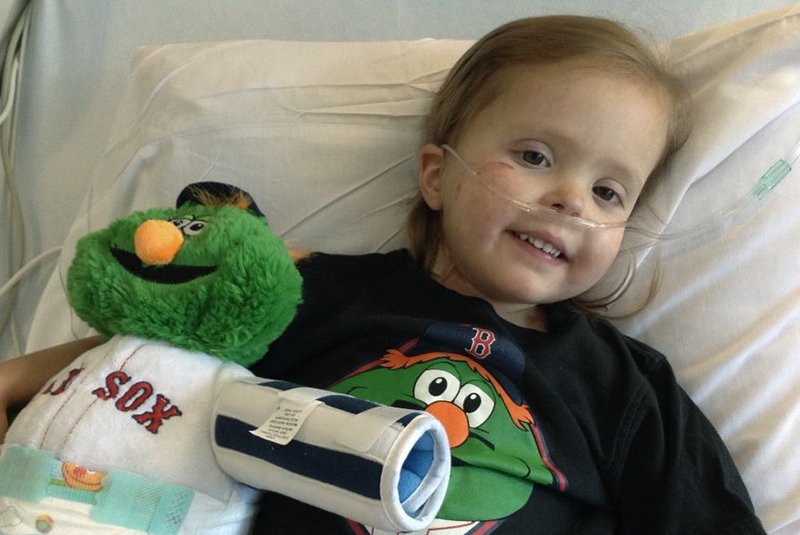After a marathon year, let’s make organ donation part of our new normal

Six years ago, an organ donor saved my daughter’s life. Cora was born with a congenital heart defect called hypoplastic left heart syndrome (HLHS), which was fatal if not treated. After more than four years living with HLHS — and six open-heart surgeries — Cora’s only chance of survival was a heart transplant. On the summer day in 2015 when we got the call, she splashed in a lake near our home, wearing a tiny black backpack that literally fueled the half a heart with which she’d been born; inside, an infusion pump clicked at regular intervals, delivering measured doses of Milrinone through a central line to keep her fist-sized heart doing the job it was ill-equipped to perform. Hours later, the phone rang, and the selfless generosity of someone I would never meet changed my life forever.
We had spent much of that spring at Boston Children’s Hospital as Cora’s wait for a donor heart stretched past the 15-month mark. The third Monday in April is a Massachusetts holiday marking Patriots’ Day and, traditionally, the running of the Boston Marathon — ironic since parenting my youngest daughter often felt like a marathon. As Cora’s future hung in the balance, the symbolism of April also being National Donate Life Month was not lost on me.
According to the United Network of Organ Sharing (UNOS), one deceased organ donor can save eight lives. The number of deceased organ donors and deceased donor-organ transplants reached an all-time high in 2020; to be exact, 18,316 deceased and living donors were responsible for 39,035 transplants in the U.S. Since December (include year – assuming 2020?), amidst the ongoing pandemic, UNOS reports performing more deceased donor-organ transplants than in years past — a pair of very exciting trends.
Due to the pandemic, the running of the 125th Boston Marathon will be held on Monday, October 11, this year. Change is hard; at this point, I’ll wager there are few among us who’d argue with that sentiment. Thinking back to July 2015 — when Cora finally received her new heart — life looked markedly different than it has of late. Following an epic surgery that lasted a dozen hours, Boston Children’s became my makeshift home. I slept on a vinyl cushion next to my daughter in the cardiac intensive care unit and fell asleep listening to helicopters landing on the roofs of nearby hospitals. It feels surreal, thinking back to a time when I sat, elbow to elbow with strangers, eating dinner from a barstool at the Longwood Grille; stood in a Starbucks line; and flung my arms around doctors when they delivered good news of my daughter’s progress.
But change is also inevitable. Today, why not lean into something you’ve not done before, something that might even feel a little bit uncomfortable? Register to become an organ donor. Today, almost 114,000 people in the United States are currently on the waiting list for a lifesaving organ transplant; every 10 minutes another name is added to the national list; and every day, 20 individuals die awaiting their chance at a new normal.
Giving the gift of life — through organ, eye, and tissue donation — comes without restriction: You can elect to become a donor 24/7, 365 days a year. While it costs nothing to become a donor, your decision to do so — in the eyes of a family awaiting organ donation — is priceless.
Cora lived for 49 days after receiving her long-awaited heart transplant. She ultimately died of antibody-mediated rejection when her own system — having been exposed to countless foreign antibodies via blood transfusions over the years — attacked the gift of a healthy graft. Still, my family’s experience with organ donation has left indelible marks on us about the most important things in life — namely taking care of each other, lifting each other up, and cheering tirelessly for our neighbors as they strive toward whatever finish line is on their horizon.
Learn about the Pediatric Transplant Center.
Related Posts :
-

After a long journey and a father's gift, surviving Wilms tumor
Eleanor (Nora) Franks was a happy, healthy toddler who loved playing with her twin brother Evan. But soon after she ...
-

From Virginia to Boston for a kidney transplant: Joshy’s story
Joshy Buchheit is a lot like most 4-year-old boys. He loves playing in the mud, riding his scooter, and keeping ...
-

Heart strong: Two families bond over shared challenges
Four years ago, Ali Marcus walked through the door of a coffee shop in Connecticut and met the woman who ...
-

Regina's journey with HLHS: Four years later
Regina was just 25 days old the first time she made the trip from her home in Mexico to Boston. Regina ...





